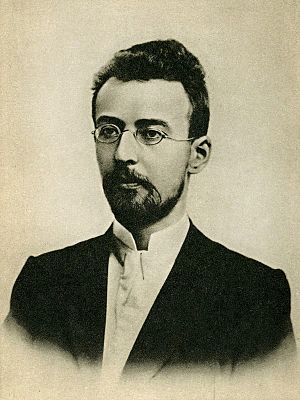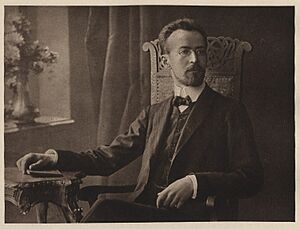Mieczysław Karłowicz facts for kids
Quick facts for kids
Mieczysław Karłowicz
|
|
|---|---|
 |
|
| Born | 11 December 1876 Vishnyeva, Vilna Governorate, Russian Empire
|
| Died | 8 February 1909 (aged 32) |
Mieczysław Karłowicz ([miɛt͡ʂɨswaf ˈkarwɔvit͡ʂ], 11 December 1876 – 8 February 1909) was a famous Polish composer and conductor. He is known for his beautiful orchestral music, especially his symphonic poems.
Contents
Early Life and Education
Mieczysław Karłowicz was born in a place called Vishneva. This area was part of the Russian Empire at the time, but it is now in Belarus. His family was noble, which means they belonged to an old and respected family. His father, Jan, was a Polish expert in languages, a dictionary maker, and also a musician.
When he was a child, Karłowicz learned to play the violin. He later wrote his only concerto for this instrument. He studied music in Warsaw with several teachers, including Zygmunt Noskowski. Later, he went to Berlin to continue his studies with Heinrich Urban. Karłowicz even dedicated his Serenade for Strings to Urban, which he wrote and performed while he was Urban's student. From 1906 to 1907, he also studied how to be a conductor with Arthur Nikisch.
Musical Career
Karłowicz's music is from the late Romantic period. This means his music often expressed strong emotions and used rich, dramatic sounds. He really admired Pyotr Ilyich Tchaikovsky, another famous composer, especially Tchaikovsky's Sixth Symphony. You can hear Tchaikovsky's influence in Karłowicz's early works, like his E minor symphony and his Violin Concerto.
Like many composers of his time, Karłowicz was also influenced by Richard Wagner, especially Wagner's opera Tristan und Isolde. However, Karłowicz developed his own unique musical style. He was especially good at writing for the orchestra, creating very colorful and expressive music.
Among his most important works are:
- A symphony called "Rebirth" (Op. 7)
- A Violin Concerto in A major (Op. 8)
- Music for a play called The White Dove
- Six tone poems. Tone poems are like musical stories that tell a tale or describe a scene. His tone poems include The Returning Waves, Eternal Songs, Lithuanian Rhapsody, Stanisław i Anna Oświecimowie, Smutna opowieść (A Sorrowful Tale), and Epizod na maskaradzie (Episode at a Masquerade).
His Violin Concerto was written for his former teacher, Stanisław Barcewicz. Barcewicz performed the first public show of the concerto in Berlin on March 21, 1903, with Karłowicz conducting the Berlin Philharmonic orchestra.
Karłowicz also wrote many songs for voice and piano, using words by poets like Kazimierz Przerwa-Tetmajer. Sadly, much of his other music was lost during World War II.
Later Life and Legacy
Karłowicz spent a lot of his later life in Zakopane, a town in southern Poland. He loved the mountains there and often enjoyed one of his favorite hobbies, photography, in the beautiful mountain scenery.
Mieczysław Karłowicz died at the young age of 32. He was killed in an avalanche while skiing in the Tatra Mountains in 1909. He was buried in Warsaw's Powązki Cemetery.
Today, the Szczecin Philharmonic orchestra is named after Mieczysław Karłowicz. This is a way to honor his important contributions to music.
Major Works
Here are some of the main types of music Mieczysław Karłowicz composed:
For Solo Voice
He wrote many songs for a single singer with piano accompaniment.
- 6 Songs, Op.1: These include pieces like "Saddened" and "In the Snow."
- Drugi spiewnik, Op. 3: This collection includes songs such as "Speak to me Still" and "On the Calm Dark Sea."
- Najpiękniejsze piosnki, Op. 4: (The Most Beautiful Songs)
For Piano
- Preludium i fuga podwójna, Op. 5: (Prelude and Double Fugue) This was a piece for solo piano.
For Orchestra
Karłowicz is most famous for his orchestral works.
- Serenade for Strings, Op. 2: A beautiful piece written for string instruments.
- Incidental music from Bianca da Molena, Op. 6: (The White Dove) Music written for a play.
- Symfonia "Odrodzenie", Op. 7: (Symphony "Rebirth") His only symphony.
- Concerto for Violin, Op. 8: A major work for violin and orchestra.
- Powracające fale, Op. 9: (Returning Waves) One of his symphonic poems.
- Odwieczne pieśni, Op. 10: (Eternal Songs) Another symphonic poem.
- Rapsodia litewska, Op. 11: (Lithuanian Rhapsody) A musical piece inspired by Lithuanian themes.
- Stanisław i Anna Oświecimowie, Op. 12: A symphonic poem telling a story.
- Smutna opowieść, Op. 13: (A Sorrowful Tale) Another emotional symphonic poem.
- Epizod na maskaradzie, Op. 14: (Episode at a Masquerade) This piece was finished by another composer, Grzegorz Fitelberg, after Karłowicz's death.
See also
 In Spanish: Mieczysław Karłowicz para niños
In Spanish: Mieczysław Karłowicz para niños
- List of Polish people
- Clan Ostoja
- Ostoja coat of arms
- Young Poland
 | Kyle Baker |
 | Joseph Yoakum |
 | Laura Wheeler Waring |
 | Henry Ossawa Tanner |


